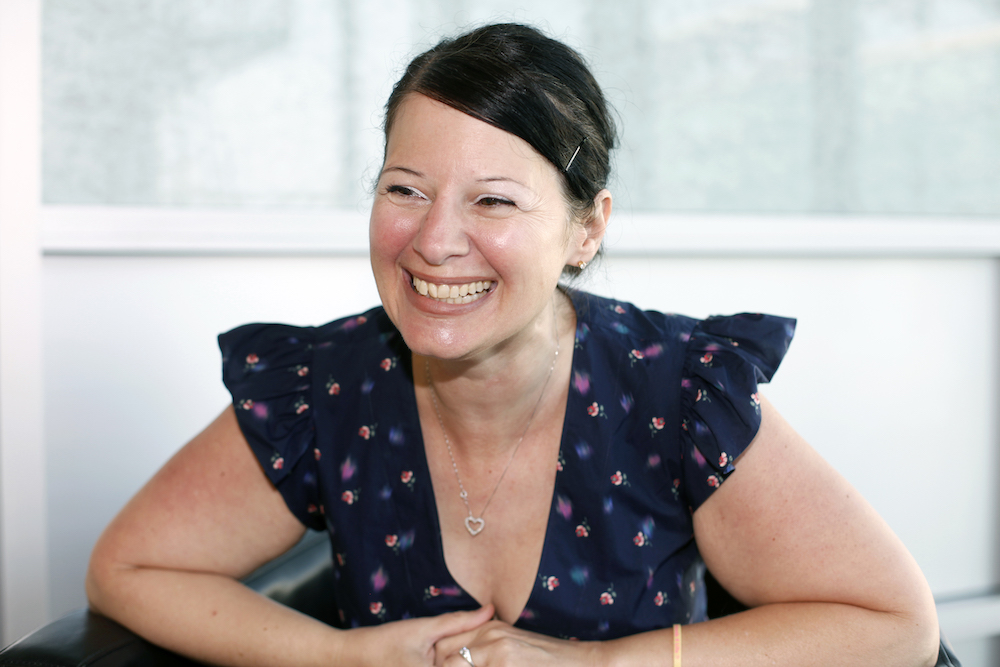
Photo by Aaron Salcido.
Jennifer Mercieca is a historian of American political rhetoric, associate professor in the Department of Communication at Texas A&M University, and a contributing editor at Zócalo Public Square. Her book about Donald Trump’s 2016 presidential campaign and demagoguery will be published in early 2020. Before taking part in a Zócalo/UCLA Anderson School of Management event titled, “Is Propaganda Keeping Americans From Thinking for Themselves?” in L.A.’s Little Tokyo, she talked in the green room about working at Chuck E. Cheese, her love of Aristotle, and the differences between rhetoric and propaganda.
What’s the best book you’ve read in the past year?
Oh, I’ve been reading a lot of books in the last year. The best book I’ve read in the last two weeks is Jason Stanley’s How Fascism Works, which was very informative and also slightly terrifying.
What’s your least favorite thing about the internet?
The weaponization of communication.
What social media website do you spend the most time on?
Twitter, hands down. It’s not even close.
What’s the strangest job you’ve ever had?
I worked at Chuck E. Cheese. I was in charge of birthday parties, and when you’re a birthday party person, you have to dress up as Chuck E. Cheese for part of it … You greet the parents, get the pizzas ordered, give out the tokens, and then you run and you put on your Chuck E. Cheese outfit, which is so hot, you have to go into the walk-in freezer and take off your hat—head—and steam comes off of you. And the kids are pulling your tail the whole time and wanting to give you hugs, which is cute, but the tail pulling’s not cute.
What are you like behind the wheel?
I grew up in California, so I learned to drive here, and I drove very fast and inappropriately when I was younger. Got into a lot of accidents. But now I’m old, and I drive about two miles each day because I live in a small town. And I drive the speed limit and use my turn signal. I can’t believe the shocking things that I used to do.
What’s one instance when propaganda has been beneficial for society?
Edward Bernays, who’s the father of propaganda and public relations, distinguished between democratic propaganda and totalitarian propaganda and said that part of the problem that the United States and other free countries were facing in the 1930s and ‘40s was that there wasn’t enough democratic propaganda, so, like, propaganda in the service of democracy. So perhaps something like FDR’s fireside chats were in the service of democracy and stability.
Who’s one person, living or dead, you’d most like to meet?
Aristotle. I have questions. My husband and I are both Aristotelians. He’s a philosopher and a Sophist … We read different books, we argue over what Aristotle said. “Well, clearly you haven’t read On Sophistical Refutations.” “Well, clearly you haven’t read Rhetoric.” Things like that. It’s rough.
What’s your favorite place to eat at in College Station?
My house.
What do you do to decompress?
I bake. I love to make something. My husband’s birthday was last week, and I made petite beef Wellingtons from a recipe on The Great British Baking Show.
What do you think is the most powerful speech in history?
There’re so many different ways to think about what would make a speech powerful. So, a dear friend of mine performed my wedding ceremony and said it was his single most important act because he joined two people forever in marriage. So, that’s pretty powerful in a speech act. I’m sure you probably wanted me to answer with something about politics. I feel like that’s going to be my answer because love wins.
What’s the difference between rhetoric and propaganda?
So, according to Aristotle, rhetoric is the counterpart of dialectic. And dialectic is the philosopher’s method of uncovering truth. Big “T” truth, eternal truth that preexists the process of discovery. Right? So you uncover it.
Rhetoric deals with matters that are not eternal truths. It is the counterpart of dialectic, meaning that it’s a method, just like dialectic is. But it’s a method that leads to phronesis, or practical truth, instead of Sophia, eternal truth. And so in its best sense, rhetoric is a way of making decisions.
Propaganda is the opposite of that. Propaganda is a kind of compliance-gaining. It’s not rhetoric, it doesn’t address people who know that they’re being addressed. Because with rhetoric, you would know if somebody was using rhetoric to try to persuade you or you were deliberating about something, you would know that. Whereas propaganda appears to be democratic, perhaps, but is actually undermining democracy. And it doesn’t value free will because it doesn’t allow people to choose for themselves, whereas rhetoric does.



